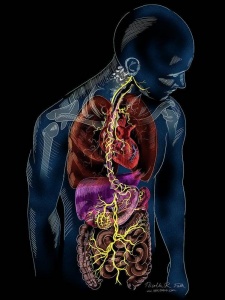Brief Anatomy Lesson on the Vagus Nerve
Did you know there’s a cranial nerve that carries vital sensory information throughout the rest of the body? It’s called the Vagus Nerve.
It controls many autonomic functions and reflex actions such as coughing, sneezing, and swallowing. Also known as the “gateway nerve,” it sets the stage for the rest of the healthy functions in your body.
The Vagus Nerve communicates both motor and sensory functions to the organs and prevents inflammation in the body, according to Mental Floss. Also known as the longest cranial nerve, the Vagus Nerve sends messages to vital organs throughout the body like the gut, heart, and lungs.
Nicknamed “wanderer,” this nerve wanders throughout your body and sends fibers to your brain stem and messages to organs. The messages are sent from the brain, through the face, thorax, and abdomen.
As the longest of 12 cranial nerves, the Vagus Nerve carries approximately 75% of the cranial parasympathetic function.

The Parasympathetic System Versus Sympathetic Nervous System
The Parasympathetic System supports your immune system, slows down digestion, and heart rate. It can also help restore the body’s functions as you “rest and digest.”
On the other hand, the Sympathetic Nervous System prepares your body for a “fight or flight” response. It inhibits the immune system, decreases digestive activity, and increases the heart rate.
When your Vagus Nerve is irritated or inflamed, talk to a chiropractor or health expert. Making simple lifestyle changes can also make a huge difference.
What does the Vagus Nerve Control?
The Vagus Nerve is a part of the Parasympathetic Nervous System responsible for the “rest and digest” response in your body.
According to an article by Frontiers in Psychiatry, the Vagus Nerve sends messages to other organs in your body. It sends messages regarding heart rate, digestion, respiratory, or certain reflexes. It’s also responsible for slowing down heart rate.
For instance, someone who gets heart palpitations, gets sick often, or has anxiety attacks might have a Vagus Nerve that needs stimulation.
The Importance of Vagal Tone and the Gut Connection to Mental Health
Vagal tone refers to activity relating to the Vagus Nerve. Here’s the scientific definition: “Vagal tone is an internal biological process that represents the activity of the vagus nerve.” Some people can recuperate or relax fairly quickly due to “stronger vagus activity,” according to this article.
“The stronger your vagus response or vagal tone is, the stronger your body is at regulating blood glucose levels, reducing the likelihood of diabetes, stroke, and cardiovascular disease,” writes Melt Method.
It’s important to check in on your vagal tone and ensure your body is balanced enough to have the ability to adapt to stressors.
Usually, the vagal tone has a gut connection. When you notice your mental health taking a turn, it’s most likely the vagal tone is off. It can’t properly regulate or send signals to the rest of your body to control vital organs.
To remedy this situation, simple exercises can help stimulate the cranial nerve. An increased vagal tone means that your body can recuperate and relax after a stress episode, according to this article.
Ways to Naturally Boost Your Vagus Nerve and Maintain a Healthy Lifestyle
You can maintain a healthy Vagus Nerve through cold exposure, among other natural remedies. This helps the muscles calm your “fight or flight” response. If you take warm showers, consider switching your daily routine and taking cold showers instead. The cold may help alleviate stress and anxiety.
Often, singing and humming can also elevate the Vagus Tone and make it easier to send relaxing signals to your body. Since the Vagus Nerve is connected to your vocal cords, singing your favorite song when you’re feeling agitated or extra anxious can help.
Other changes include deep breathing and meditation exercises to calm the “fight or flight” response. Studies show that meditating for as little as 10 minutes a day and taking longer exhalations can improve the parasympathetic system. Making these simple changes can also reduce anxiety and prepare your Vagus Nerve for relaxation.
You can maintain a healthy lifestyle by getting the recommended daily exercise and checking in with your chiropractor.
To book a consultation, visit Flintridgefamilychiropractic.com.





